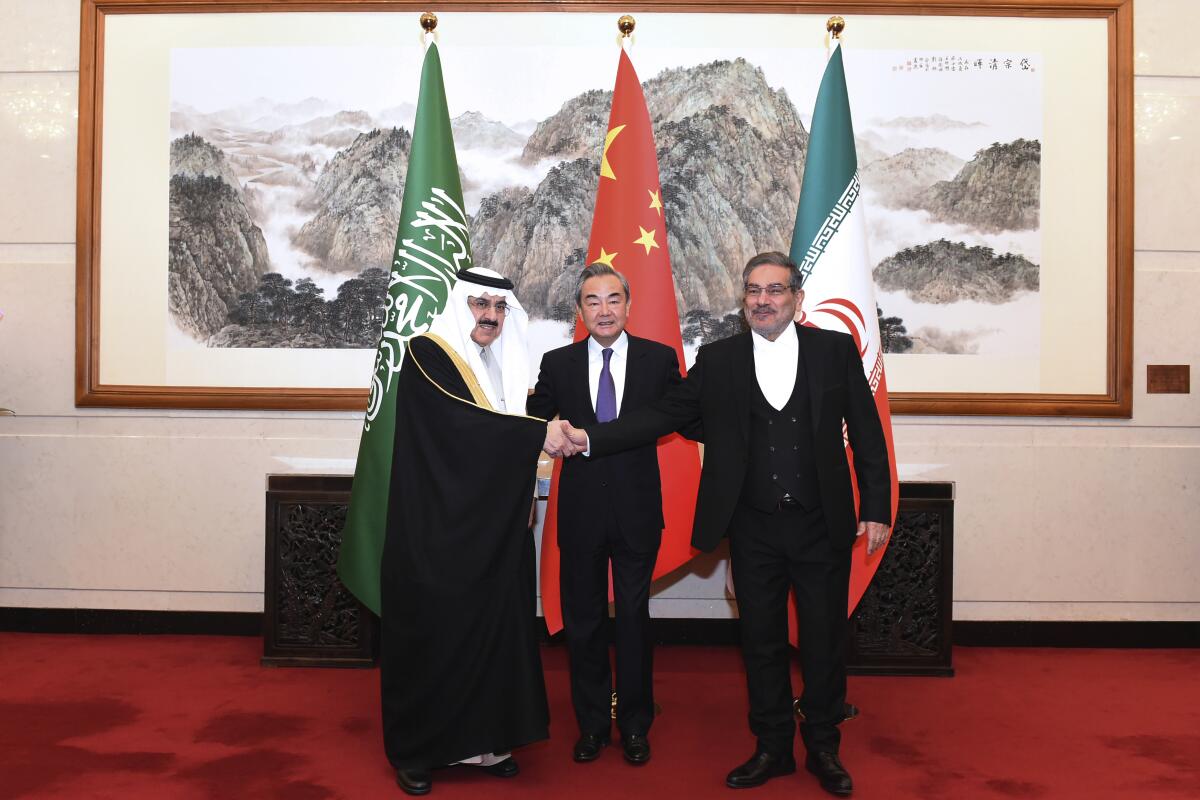Saudi deal with Iran worries Israel, shakes up Middle East

JERUSALEM — News of the rapprochement between longtime regional rivals Saudi Arabia and Iran sent shock waves through the Middle East on Saturday and dealt a symbolic blow to Israeli Prime Minister Benjamin Netanyahu, who has made the threat posed by Tehran a public diplomacy priority and personal crusade.
The breakthrough — a culmination of more than a year of negotiations in Baghdad and more recent talks in China — also became ensnared in Israel’s internal politics, reflecting the country’s divisions at a moment of national turmoil.
The agreement, which gives Iran and Saudi Arabia two months to reopen their respective embassies and reestablish ties after seven years of rupture, more broadly represents one of the most striking shifts in Middle Eastern diplomacy over recent years. In countries like Yemen and Syria, long caught between the Sunni kingdom and the Shiite powerhouse, the announcement stirred cautious optimism.
In Israel, it caused disappointment — along with finger-pointing.
British military officials say Russian forces have made progress in a campaign to capture the eastern Ukraine city in the war’s longest ground battle.
One of Netanyahu’s greatest foreign policy triumphs remains Israel’s U.S.-brokered normalization deals in 2020 with four Arab states, including Bahrain and the United Arab Emirates. They were part of a wider push to isolate and oppose Iran in the region.
He has portrayed himself as the only politician capable of protecting Israel from Tehran’s rapidly accelerating nuclear program and regional proxies, like Hezbollah in Lebanon and Hamas in the Gaza Strip. Israel and Iran have also waged a regional shadow war that has led to suspected Iranian drone strikes on Israeli-linked ships ferrying goods in the Persian Gulf, among other attacks.
A normalization deal with Saudi Arabia, the most powerful and wealthy Arab state, would fulfill Netanyahu’s prized goal, reshaping the region and boosting Israel’s standing in historic ways. Even as backdoor relations between Israel and Saudi Arabia have grown, the kingdom has said it won’t officially recognize Israel before a resolution to the decades-long Israeli-Palestinian conflict.
Since returning to office late last year, Netanyahu and his allies have hinted that a deal with the kingdom could be approaching. In a speech to American Jewish leaders last month, Netanyahu described a peace agreement as “a goal that we are working on in parallel with the goal of stopping Iran.”
But experts say the Saudi-Iran deal that was announced Friday has thrown cold water on those ambitions. Saudi Arabia’s decision to engage with its regional rival has left Israel largely alone as it leads the charge for diplomatic isolation of Iran and threats of a unilateral military strike against Iran’s nuclear facilities. The UAE also resumed formal relations with Iran last year.
“It’s a blow to Israel’s notion and efforts in recent years to try to form an anti-Iran bloc in the region,” said Yoel Guzansky, an expert on the Persian Gulf at the Institute for National Security Studies, an Israeli think tank. “If you see the Middle East as a zero-sum game, which Israel and Iran do, a diplomatic win for Iran is very bad news for Israel.”
Even Danny Danon, a Netanyahu ally and former Israeli ambassador to the United Nations who recently predicted a peace agreement with Saudi Arabia in 2023, seemed disconcerted.
“This is not supporting our efforts,” he said, when asked about whether the rapprochement hurt chances for the kingdom’s recognition of Israel.
In Yemen, where the rivalry between Saudi Arabia and Iran has played out with the most destructive consequences, both warring parties were guarded, but hopeful.
A Saudi-led military coalition intervened in Yemen’s conflict in 2015, months after the Iran-backed Houthi militias seized the capital, Sana, in 2014, forcing the internationally recognized government into exile in Saudi Arabia.
The Houthi rebels welcomed the agreement as a modest but positive step.
“The region needs the return of normal relations between its countries, through which the Islamic society can regain security lost from foreign interventions,” said Houthi spokesman and chief negotiator Mohammed Abdulsalam.
The Saudi-backed Yemeni government expressed some optimism — and caveats.
“The Yemeni government’s position depends on actions and practices not words and claims,” it said, adding that it would proceed cautiously “until observing a true change in [Iranian] behavior.”
Analysts did not expect an immediate settlement to the conflict, but said direct talks and better relations could create momentum for a separate agreement that may offer both countries an exit from a disastrous war.
“The ball now is in the court of the Yemeni domestic warring parties to prioritize Yemen’s national interest in reaching a peace deal and be inspired by this initial positive step,” said Afrah Nasser, a nonresident fellow at the Washington-based Arab Center.
Anna Jacobs, senior Persian Gulf analyst with the International Crisis Group, said she believed the deal was tied to a de-escalation in Yemen. “It is difficult to imagine a Saudi-Iran agreement to resume diplomatic relations and reopen embassies within a two-month period without some assurances from Iran to more seriously support conflict resolution efforts in Yemen.”
War-scarred Syria similarly welcomed the agreement as a move toward easing tensions that have exacerbated the country’s conflict. Iran has been a main backer of Syrian President Bashar Assad’s government, while Saudi Arabia has supported opposition fighters trying to remove him from power.
In Israel, bitterly divided and gripped by mass protests over plans by Netanyahu’s far-right government to overhaul the judiciary, politicians seized on the rapprochement between the kingdom and Israel’s archenemy as an opportunity to criticize Netanyahu, accusing him of focusing on his personal agenda at the expense of Israel’s international relations.
Opposition leader Yair Lapid denounced the agreement as “a full and dangerous failure of the Israeli government’s foreign policy.”
More to Read
Sign up for Essential California
The most important California stories and recommendations in your inbox every morning.
You may occasionally receive promotional content from the Los Angeles Times.











